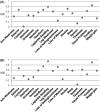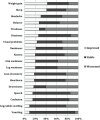The Brain Metastases Symptom Checklist as a novel tool for symptom measurement in patients with brain metastases undergoing whole-brain radiotherapy
- PMID: 27330360
- PMCID: PMC4900843
- DOI: 10.3747/co.23.2936
The Brain Metastases Symptom Checklist as a novel tool for symptom measurement in patients with brain metastases undergoing whole-brain radiotherapy
Abstract
Purpose: We evaluated the feasibility, reliability, and validity of the Brain Metastases Symptom Checklist (bmsc), a novel self-report measure of common symptoms experienced by patients with brain metastases.
Methods: Patients with first-presentation symptomatic brain metastases (n = 137) referred for whole-brain radiotherapy (wbrt) completed the bmsc at time points before and after treatment. Their caregivers (n = 48) provided proxy ratings twice on the day of consultation to assess reliability, and at week 4 after wbrt to assess responsiveness to change. Correlations with 4 other validated assessment tools were evaluated.
Results: The symptoms reported on the bmsc were largely mild to moderate, with tiredness (71%) and difficulties with balance (61%) reported most commonly at baseline. Test-retest reliability for individual symptoms had a median intraclass correlation of 0.59 (range: 0.23-0.85). Caregiver proxy and patient responses had a median intraclass correlation of 0.52. Correlation of absolute scores on the bmsc and other symptom assessment tools was low, but consistency in the direction of symptom change was observed. At week 4, change in symptoms was variable, with improvements in weight gain and sleep of 42% and 41% respectively, and worsening of tiredness and drowsiness of 62% and 59% respectively.
Conclusions: The bmsc captures a wide range of symptoms experienced by patients with brain metastases, and it is sensitive to change. It demonstrated adequate test-retest reliability and face validity in terms of its responsiveness to change. Future research is needed to determine whether modifications to the bmsc itself or correlation with more symptom-specific measures will enhance validity.
Keywords: Brain metastases; patient-reported outcomes; symptoms; whole-brain radiotherapy.
Figures




References
-
- Langley RE, Stephens RJ, Nankivell M, et al. on behalf of the quartz investigators Interim data from the Medical Research Council quartz trial: does whole brain radiotherapy affect the survival and quality of life of patients with brain metastases from non-small cell lung cancer? Clin Oncol (R Coll Radiol) 2013;25:e23–30. doi: 10.1016/j.clon.2012.11.002. - DOI - PubMed
LinkOut - more resources
Full Text Sources
Other Literature Sources

